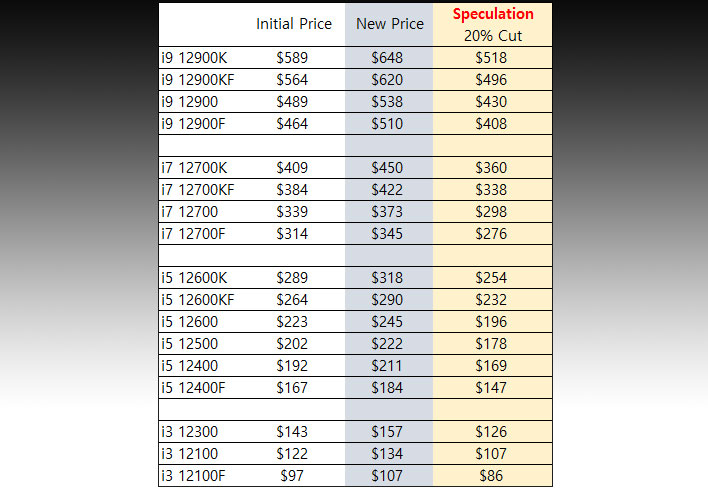If you're looking to stretch your bucks for the most bang, the smart money is usually on staying a generation behind—that's often where the real value proposition lies. The trade off, of course, is you miss out on the latest and greatest features available. But if you don't need to live on the cutting edge, staying a car length behind pole position is a great way to enjoy the ride at a still-brisk pace. We mention this because Intel's
12th Gen Core processors based on Alder Lake are supposedly getting ready to fall in price.
Alder Lake already offers a decent value with many of the same benefits as
Raptor Lake, key among them being a hybrid architecture. While not the first to do so, Alder Lake's release marked a major shift in Intel's CPU strategy. It pairs up to eight 'Performance' cores (P-cores) based on Golden Cove with up to eight lower power 'Efficient' cores (E-Cores) based on Gracemont. Since the P-cores support Hyper Threading, a max config boasts 16 cores and 24 threads.
Intel has since come out with its 13th Gen Core lineup based on Raptor Lake. It's built on the same
Intel 7 process node while offering some key upgrades, such as up to 2X the number of E-cores, a shift to Raptor Cove with faster clocks for the P-cores, more L2 cache, improved memory latency and bandwidth, and generally a performance uplift across the board.
It's not a major redesign, though, and Alder Lake is still a stout architecture. Depending on your budget and what you're trying to accomplish, an argument could be made for building a PC around Intel's 12th Gen chips, even though they're no longer the newest silicon. That's especially true if rumors of a price cut prove to be true, and they get passed along to consumers (more on that in a moment).
According to
Digitimes, Intel is getting ready to
slash Alder Lake pricing by as much as 20 percent. Notorious leaker
@harukaze5719 charted what that would look like across the board, assuming each CPU across the board benefited from a full 20 percent reduction in MSRP. Check it out...
As shown in the graph, a 20 percent price cut would more than offset recent price hikes. One thing to keep in mind, though, is that Intel's recommend customer pricing (RCP) is basically for bulk orders in trays of 1,000 units. Retail pricing is often different. PC shop owners have to eat, right?
So what does this ultimately mean? Perhaps nothing, if retailers choose to keep the savings for themselves (and assuming the price cuts come to fruition). Or it could mean that even lower retail pricing is in store for consumers. If the latter ends up being the case, a solid value proposition will become an even better one in the near future.

